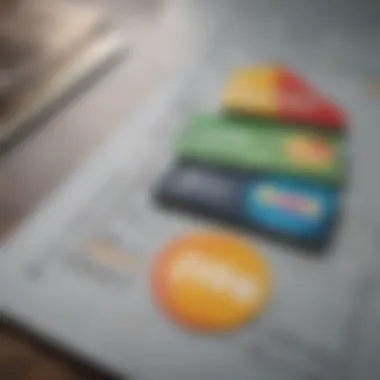Paying Off Your Mortgage with a Credit Card: Is It Feasible?


Intro
In recent financial discussions, unconventional repayment methods have garnered attention. One such method is the use of a credit card to pay off a mortgage. This approach raises several questions about its feasibility and implications. Homeowners are exploring the potential benefits and risks of this strategy. Credit cards can offer flexibility, often accompanied by rewards. However, they also come with high-interest rates and fees. Understanding the nuances is essential for making informed decisions.
This article will delve into the practicality of this financial tactic. In particular, we will assess market conditions, economic indicators, and potential advantages. We will also discuss alternative strategies available for mortgage repayment. The aim is to provide investors and homeowners with a comprehensive understanding of this topic.
Market Overview
Current Market Conditions
The overall mortgage market is influenced by multiple factors. Interest rates, consumer sentiment, and economic stability play crucial roles. Recent trends indicate a slight increase in interest rates. This can affect homeowners' ability to secure favorable mortgage terms. Those with existing mortgages may seek ways to reduce their debt burden. Some are considering credit cards as an option for fast payoff.
Key Economic Indicators
Several indicators inform the state of the housing and credit market. These include:
- Interest Rates: The cost of borrowing directly impacts mortgage decisions.
- Inflation Rates: Higher inflation can reduce purchasing power, motivating debt repayment.
- Unemployment Rates: Job stability affects consumer confidence in mortgage commitments.
Monitoring these indicators helps individuals determine the viability of using credit for mortgage payoff.
Major Market Trending Factors
Current trends show an increase in mortgage delinquencies. This can be attributed to economic uncertainties. Homeowners are looking for alternatives to manage their debts. The push towards digital financial solutions is notable. Credit card companies are also promoting balance transfer offers. These developments create an environment where non-traditional repayment methods are explored.
Evaluating the Strategy
Pros and Cons of Paying Mortgage with a Credit Card
When considering this approach, it is vital to weigh advantages against potential disadvantages.
Pros:
- Quick Access to Funds: Credit cards can provide immediate cash flow.
- Rewards Programs: Some might earn points or cashback by using their credit card.
- Simplified Payments: Consolidating obligations could simplify monthly management.
Cons:
- High-Interest Rates: Credit cards often have higher rates compared to mortgages.
- Debt Cycle Risk: There is a danger of accumulating more debt without careful management.
- Impact on Credit Score: Using a large portion of credit limits can affect credit scores negatively.
A careful assessment is necessary before undertaking this approach.
Alternative Repayment Strategies
There are various strategies available for mortgage repayment. Homeowners should explore these to find the best fit for their circumstances.
- Refinancing: Many consider refinancing to benefit from lower rates.
- Extra Payments: Making additional payments towards the principal can save on interest.
- Home Equity Loans: These can offer lower rates compared to credit cards.
Each alternative has its own implications and should align with the overall financial strategy.
Epilogue
The choice to use a credit card for mortgage repayment is not straightforward. It requires a deep understanding of personal finances and market conditions. Homeowners must analyze their unique situations. Caution is advised when committing to such financial decisions, considering the high stakes involved.


Foreword to Mortgage Payments
Understanding how mortgage payments work is essential for anyone considering paying off their mortgage with a credit card. This section serves as a foundational framework for discerning the implications of utilizing credit in such a manner. Mortgages are long-term loans secured by real estate, and they typically entail significant financial commitment. Thus, comprehending the mechanics of mortgage payments is key before venturing into unconventional repayment methods.
Understanding Mortgages
A mortgage is generally understood as a loan that enables individuals to buy property. The borrower receives a lump sum from a lender, which is then repaid over time with interest. Mortgages come in various forms, such as fixed-rate and adjustable-rate mortgages. Each type carries its specific terms and conditions that influence monthly payments. When engaging with mortgages, it is vital to recognize how interest rates, loan terms, and principal amounts affect the overall cost. Employing a credit card to settle such payments introduces unique variables that require careful contemplation.
The Role of Regular Payments
Regular payments on a mortgage are crucial for maintaining financial health and ownership of property. These payments typically consist of principal and interest amounts. Timely payments contribute to the total equity built in the property and keep the lender's trust intact. Failing to meet payment obligations can lead to severe consequences, including foreclosure. Thus, understanding the intricacies of making regular mortgage payments is essential before exploring alternative repayment strategies, including those involving credit cards.
Deciding to pay off a mortgage with a credit card might seem appealing due to various incentives like reward points or temporary liquidity. However, it is imperative to weigh these benefits against the potential pitfalls associated with credit usage. Understanding regular mortgage payments creates a context to assess the risks of transferring that responsibility onto a credit card. In this discussion, we lay a coherent groundwork that will facilitate further exploration into the mechanisms of using credit cards for mortgage payments.
Intro to Credit Cards
Credit cards are a pivotal component of modern consumer finance. Understanding how credit cards operate is crucial, especially when one considers unconventional methods of managing significant debts, such as mortgages. Using a credit card to pay off a mortgage is an approach that demands careful consideration of both the mechanics of credit cards and their associated costs. It is not merely about convenience but also about potential financial strategy that can enhance liquidity and provide reward opportunities.
How Credit Cards Function
Credit cards provide a revolving line of credit that allows users to borrow funds, up to a pre-approved limit, to make purchases or access cash. When a cardholder uses a credit card, they do not immediately pay cash; instead, they promise to repay the borrowed amount later. Typically, this repayment occurs within a month but can be extended to months or even years if the cardholder only makes minimum payments.
Credit cards function by charging interest on any remaining balance after the due date. Users can avoid interest by paying the full statement balance on time. Furthermore, most credit cards offer a variety of rewards, like cash back or points for travel, which can incentivize spending. This functionality becomes crucial when contemplating the possibility of redirecting these benefits towards mortgage repayment.
Typical Interest Rates and Fees
It is essential to recognize the typical interest rates and fees associated with credit cards. Interest rates vary significantly based on the user's creditworthiness, the card issuer, and the specific card itself. Generally, interest rates can range from about 15% to 25%, depending on these factors. Moreover, some cards may impose additional fees such as annual fees, late payment fees, and cash advance fees.
- Annual Fees: Often charged for credit cards that offer premium benefits.
- Late Payment Fees: Can add to the cost if payments are made past the due date.
- Cash Advance Fees: Usually a percentage of the amount withdrawn or a fixed fee, whichever is higher. This fee is relevant when considering paying off a mortgage through credit card advances.
Given that mortgages typically have lower interest rates, using a high-interest credit card can increase the financial burden rather than alleviate it. This is a crucial consideration for anyone exploring the viability of paying off a mortgage using a credit card. Thus, thorough analysis of these rates and fees is essential for making an informed decision.
Important Note: Careful evaluation of the terms and conditions associated with credit card usage is vital. The lure of rewards should not overshadow the potential pitfalls of elevated interest rates and fees.
Mechanism of Paying Off a Mortgage with a Credit Card
Understanding the mechanics behind using a credit card to pay off a mortgage is crucial for both investors and homeowners. The fundamental element is keenly recognizing how credit can be employed in mortgage repayment. This discussion delves into the specific processes involved, including cash advances and charge card transactions, both of which offer distinct advantages and considerations.
Cash Advances from Credit Cards
Cash advances represent a method where one can withdraw cash from a credit card account. This option can provide immediate liquidity, which is often essential for managing mortgage payments. However, it is vital to consider several aspects of this method:
- High Interest Rates: Cash advances typically incur higher interest rates compared to regular purchases. This can significantly elevate the cost over time, negating any benefits from using the card for payments.
- Fees: Most credit card issuers apply cash advance fees. This is usually a percentage of the withdrawal amount, adding another layer of cost.
- No Grace Period: Unlike regular purchases, cash advances usually do not have a grace period. Interest begins accruing immediately, making it less favorable if not repaid quickly.
Given these factors, utilizing cash advances for mortgage payments can be risky. While it can solve immediate cash flow issues, understanding the long-term financial implications is essential.
Using Charge Cards for Transactions
Another route to consider is through charge cards, which differ slightly from traditional credit cards. Charge cards require the balance to be paid in full every month. Using charge cards to manage mortgage payments can provide the following benefits:
- Credit Utilization: Charge cards can improve your credit utilization ratio, positively impacting your credit score as they are typically used for large transactions.
- Reward Programs: Some charge cards offer rewards, such as points or cashback, for transactions. If a mortgage payment can be processed through such a card, it could yield significant returns.
- Financial Flexibility: Charge cards offer a level of flexibility in payment scheduling, which may help in smoother cash management over time.
However, charge cards require discipline in managing payments. Missing a payment can incur substantial fees and negatively affect credit ratings. It is important to evaluate if this strategy aligns with one’s overall financial behavior.


Utilizing credit cards for mortgage payments is not without its challenges. Thorough knowledge and careful planning are critical for navigating potential pitfalls.
Exploring both cash advances and charge card transactions frames the larger conversation about credit management in the context of mortgage repayment strategies. As such, a wise financial approach is essential to ensure that these mechanisms serve to enhance, rather than jeopardize, financial stability.
Potential Advantages
Exploring the viability of paying off a mortgage with a credit card reveals several potential advantages. Understanding these benefits is critical for anyone considering this financial strategy. Using a credit card for mortgage payments can provide short-term liquidity improvements, allow for rewards points accumulation, and potentially assist in improving one's credit utilization ratio.
Short-term Liquidity Improvement
One significant advantage of utilizing a credit card to pay off a mortgage is the boost in short-term liquidity. By converting a large mortgage payment into a credit card payment, homeowners can temporarily free up cash. This can be valuable in emergency situations or during process of managing unexpected expenses. With additional liquidity, individuals may redirect funds towards other pressing financial obligations or investments, allowing them to navigate financial challenges fluidly.
It is crucial, however, to emphasize that this liquidity boost is often temporary. Once the credit card bill arrives, the obligation to pay it off remains. Therefore, planning and discipline are needed to maintain this advantage.
Reward Points Accumulation
Using a credit card often comes with rewards programs that can accumulate points, cash back, or miles. This can be leveraged effectively when paying off a mortgage. Regular payment on a substantial amount, like a mortgage, can translate into significant rewards. For some cardholders, collecting points or cashback from these transactions can enhance their overall financial portfolio.
Keep in mind that not all credit cards have the same benefits. Choosing a card with a robust rewards program can maximize the financial gain experienced through these transactions. Ultimately, the accumulation of rewards points can serve as an additional incentive and, if managed wisely, can supplement one’s finances meaningfully.
Improving Credit Utilization Ratio
Another advantage of using a credit card for mortgage payments is the positive impact on the credit utilization ratio. This ratio is a key factor in calculating a credit score and refers to the amount of credit being used relative to an individual's total available credit. Paying off a mortgage with a credit card can help decrease the percentage of used credit, potentially leading to a higher credit score.
Improving the credit utilization ratio can open up more favorable lending opportunities in the future. Lenders typically look favorably on individuals with a strong credit score. However, this improvement is contingent upon paying off the credit card balance in a timely manner to avoid high-interest charges.
The potential advantages of using a credit card to pay off a mortgage must be weighed against the risks involved. Understanding these key points is essential for informed financial decision-making.
Significant Risks
Exploring the viability of paying off a mortgage using a credit card reveals numerous risks that homeowners must seriously consider. While the concept may appeal due to potential rewards, the inherent dangers can outweigh any benefits if not approached with caution. Understanding these risks is critical for making informed financial decisions. This section discusses three primary risks that come with using a credit card in this manner: high interest rates, increased debt load, and possible impacts on credit scores.
High Interest Rates on Credit Cards
One of the most significant risks involves the high interest rates typically associated with credit cards. Many credit cards carry interest rates that can exceed 20%. If a homeowner uses a credit card to pay off their mortgage, they may find themselves in a position where the rate of interest becomes detrimental. Mortgages often have lower interest rates, especially if locked in for a long period.
Failing to pay down the credit card balance in full each month can lead to accumulating debt at high rates. For instance, interest can compound daily, quickly leading to substantial financial amounts on top of the original mortgage balance.
It is imperative to evaluate whether the potential benefits, like reward points or temporary liquidity, can compensate for the risk of incurring greater debt due to high interest. Furthermore, those new to managing credit may underestimate how quickly balances can grow when only paying the minimum.
Potential for Increased Debt Load
Utilizing a credit card to satisfy a mortgage obligation can lead to an overall increased debt load. This increase can happen quickly, with the credit card balance often remaining higher than the mortgage payoff amount. If the homeowner consistently uses credit cards for other expenses as well, the debt can reach alarming levels.
The complexities of managing multiple debts can confuse borrowers, potentially leading to missed payments or defaults.
Here are some considerations to gauge this risk:
- Increased balances: The homeowner might not realize how much total debt they are accruing until it is too late.
- Multiple payments: Managing different payment schedules can become overwhelming and create financial strain.
- Credit utilization: High credit card balances can negatively affect the homeowner's credit utilization ratio, further exacerbating financial challenges.
Impact on Credit Score
The impact on credit score is another paramount concern for individuals considering this strategy. Credit scores are significantly important as they affect borrowing capabilities, future loans, and even insurance premiums. Using a credit card to pay a mortgage can generate unpredictable swings in one’s credit score.


Using a large portion of available credit can result in a drop in the score due to higher credit utilization, which is a critical component of credit evaluations. Additionally, regularly maxing out credit cards may present a red flag to lenders, indicating financial instability.
The impact of credit card use on scores can be long-lasting, with consequences that hinder personal financing opportunities.
Alternative Strategies for Mortgage Repayment
The quest for effective mortgage repayment strategies extends beyond conventional methods. This section delves into alternative approaches that can be adopted by homeowners seeking financial relief. Understanding these strategies is vital as they offer various benefits that might be more suitable depending on individual circumstances.
Refinancing Options
Refinancing is a common tactic where a homeowner replaces their existing mortgage with a new one, typically at a lower interest rate. This can lead to reduced monthly payments or a shorter loan term, both of which can generate long-term savings. Refinancing can also offer individuals the chance to access equity built in the property if cash is needed. However, it is essential to consider the closing costs associated with refinancing. Calculating the break-even point, where savings offset these costs, is necessary for making an informed decision.
Bi-weekly Payment Plans
A bi-weekly payment plan restructures the traditional monthly payment system. Instead of making one monthly payment, homeowners pay half their monthly mortgage amount every two weeks. This method results in one extra full payment each year, which can significantly reduce the principal balance over time. It may feel slight, but the long-term impact on interest paid and loan duration can be substantial. It is crucial to confirm whether your lender allows this frequency to avoid penalties or misallocations.
Debt Snowball vs.
Debt Avalanche Methods
Both debt snowball and debt avalanche methods are popular approaches for managing debts, and they can be applied to mortgage repayment as well. With the debt snowball method, individuals focus on paying off the smallest debts first while maintaining minimum payments on larger ones. This approach builds momentum through small victories, which can be psychologically rewarding.
In contrast, the debt avalanche method prioritizes debts with the highest interest rates. This strategy is mathematically efficient as it minimizes the total interest paid over time. Choosing between these methods depends on personal preferences and situations.
The choice of repayment strategy can significantly influence your overall financial health. Assessing the pros and cons of each alternative method leads to better financial decisions.
Managing Credit Responsibly
Managing credit responsibly is crucial when considering the use of a credit card for mortgage payments. Credit is a powerful tool, offering not only the potential for flexibility but also significant risks when not handled correctly. Homeowners must grasp the implications of their financial decisions, especially in the context of applying credit in unconventional ways.
Establishing a Budget
Creating a budget is an essential step in managing credit responsibly. It involves documenting income sources and estimating monthly expenses, ensuring that all financial commitments are met. A detailed budget reflects the priorities in spending and helps avoid overspending, which could lead to increased debt.
- Identify fixed costs: This includes mortgage payments, utility bills, and insurance. Knowing these amounts helps allocate funds effectively.
- Include variable expenses: Groceries, entertainment, and unforeseen costs also need to be factored in. Tracking these can reveal spending patterns.
- Allocate for debt repayment: Ensure that there is a specific portion of the budget dedicated to paying off credit card balances in full each month.
Setting aside a contingency fund is also a wise practice. This fund can cushion against unexpected expenses that might otherwise lead to reliance on credit.
Monitoring Credit Reports
Regularly monitoring credit reports is a critical aspect of managing credit. Awareness of one’s credit score or history allows homeowners to make informed decisions. Knowing what influences the score can lead to better financial outcomes.
- Check for accuracy: Errors on credit reports can negatively impact scores. Regular checks help catch inaccuracies early.
- Understand usage impact: High credit utilization levels can harm credit scores. Try to keep utilization below 30% of total credit limits.
- Review credit inquiries: Multiple hard inquiries within a short time can reduce credit scores. Limit new applications to safeguard your standing.
Regular monitoring of credit reports fosters transparency and aids individuals in averting potential issues related to credit misuse or misunderstanding.
By emphasizing budget establishment and monitoring credit reports, individuals interested in using a credit card to pay off a mortgage can navigate their financial landscape more successfully. Engaging with these practices equips homeowners with the necessary tools to manage their credit wisely, ultimately leading to informed financial decisions.
Ending
Paying off a mortgage with a credit card is a multifaceted topic. It presents an opportunity and a set of challenges that each homeowner or investor must consider carefully. The discussion in this article has highlighted crucial elements relevant to this strategy, including the benefits, risks, and alternative repayment methods.
Weighing Benefits Against Risks
When evaluating the viability of this financial maneuver, it is essential to weigh the advantages against the inherent risks. Benefits such as short-term liquidity improvements and potential rewards from credit card usage can be appealing. These aspects can provide immediate financial relief and even some incentives through reward points. However, they must be considered alongside dangers like high interest rates and the likelihood of increasing your overall debt load. A balanced assessment allows individuals to clarify whether this approach aligns with their financial goals and stability.
Making Informed Financial Decisions
An informed approach is key when contemplating any financial strategy, including using a credit card to pay off a mortgage. Homeowners and investors should analyze their financial situations comprehensively. This means understanding one’s credit score, interest rates, and personal economic environment. Engaging in thorough research and consulting professionals, if needed, can help in making well-rounded decisions. Information is a powerful tool. Knowledgeable individuals are more likely to minimize risks while maximizing opportunities in their financial journeys.







